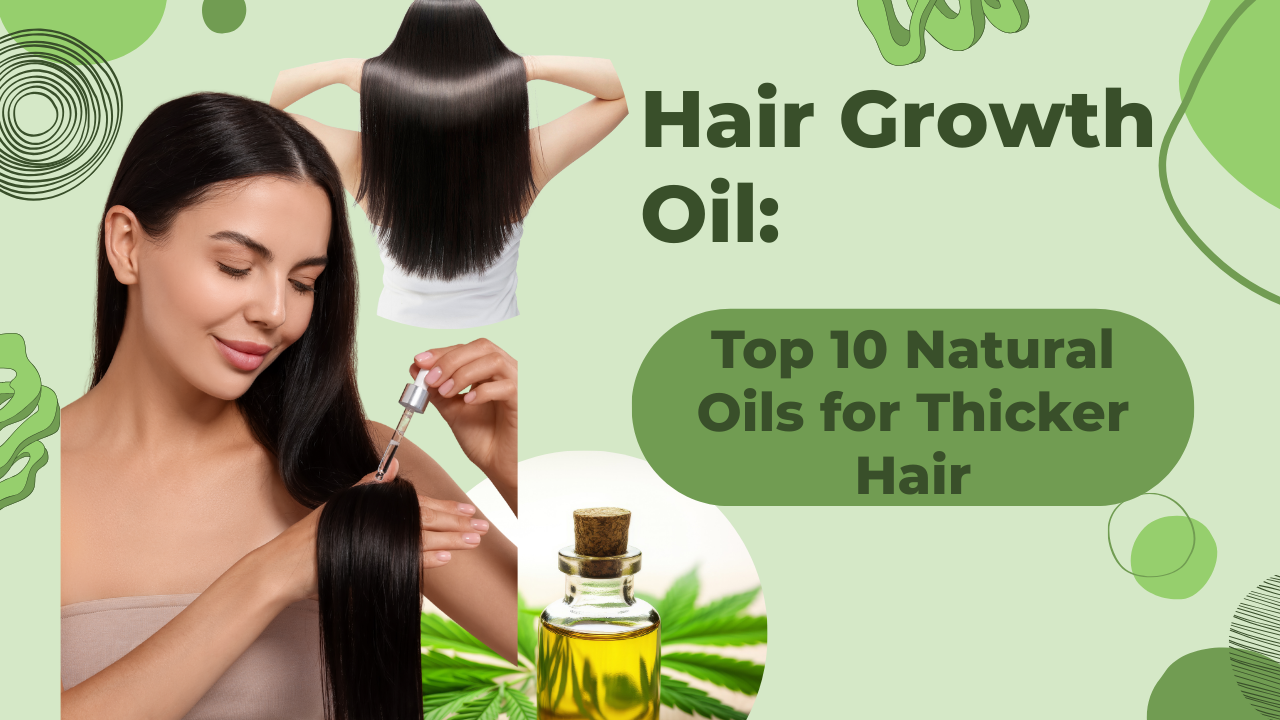Hair is more than just something that grows on our heads—it plays a big role in how we see ourselves and how others see us. Throughout history, hair has symbolized beauty, strength, and identity. Whether it’s long, curly, short, or styled, our hair often reflects our culture, personality, and confidence.
Today, many people face hair problems like thinning, breakage, and hair loss due to pollution, stress, poor diet, and harsh products. These issues can affect confidence and emotional well-being. As a result, more people are turning to natural options to restore their hair’s health, with hair growth oil becoming a popular and trusted choice.

Hair growth oil is known to deeply nourish the scalp, improve blood flow, and strengthen hair from the roots. It also helps stimulate hair follicles, supports healthy strands, and enhances overall hair appearance. In the next section, we’ll explore the top 10 natural oils for promoting strong and healthy hair growth.
Top 10 Natural Hair Growth Oils
Coconut Oil
Botanical Name: Cocos Nucifera
Why It Works:
Coconut oil is a popular choice in hair care and is often used as a natural hair growth oil. It is rich in lauric acid, which allows it to bind easily with the hair’s natural proteins. This helps the oil go deep into the hair shaft, reducing protein loss and keeping hair strong and healthy. Regular use can lead to softer, shinier hair with less breakage over time.
In addition to strengthening hair, coconut oil also has antimicrobial properties. These help protect the scalp from issues like dandruff, dryness, and minor infections. A healthy scalp creates the right environment for new hair to grow. Because of these benefits, coconut oil is often recommended as one of the best natural hair growth oils for people looking to improve hair thickness, reduce hair fall, and maintain overall scalp health.
Benefits:
Strengthens hair shafts
Reduces breakage
Adds shine and softness
Fights scalp infections
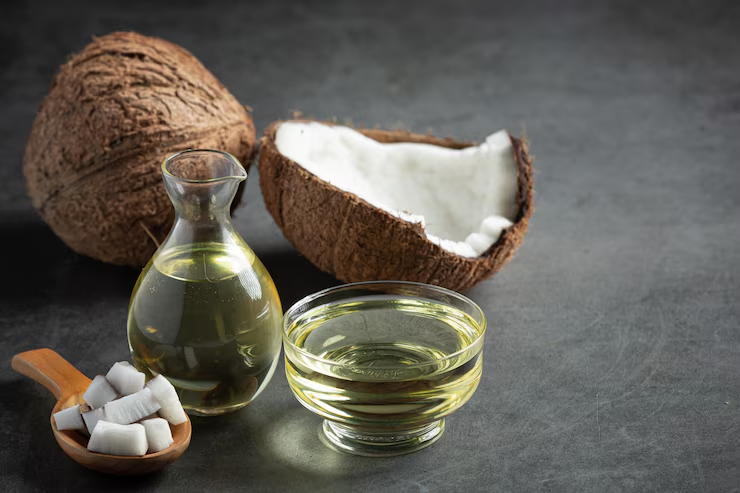
How to Use: Warm a small amount and massage into your scalp and hair length. Leave overnight for deep conditioning and wash out the next morning.
Castor Oil
Botanical Name: Ricinus Communis
Why It Works:
Castor oil is a thick, nutrient-rich hair growth oil known for its ability to support healthy hair. It contains a high amount of ricinoleic acid, which helps increase blood circulation to the scalp. This improved flow of nutrients encourages hair follicles to grow stronger, promoting thicker and fuller hair over time.
Besides boosting hair growth, castor oil also offers anti-inflammatory benefits. These properties make it helpful for soothing scalp issues like dandruff, itchiness, and dryness. A clean, healthy scalp is essential for new hair to grow without interruption. Due to its rich texture, castor oil is often mixed with lighter oils for easier application. When used regularly as a hair growth oil, it can support better hair strength, reduce breakage, and create the right conditions for long-lasting hair health.
Benefits:
Promotes rapid hair growth
Prevents split ends
Treats dandruff and dry scalp
Strengthens roots
How to Use: Mix with a lighter oil (like coconut or jojoba) to ease application. Massage into scalp, cover with a warm towel, and leave for a few hours before washing.
Argan Oil
Botanical Name: Argania Spinosa
Why It Works:
Argan oil, often called “liquid gold,” is a highly valued hair growth oil known for its powerful benefits. It is packed with essential fatty acids, antioxidants, and vitamin E, all of which help nourish both the scalp and hair. This oil deeply moisturizes, improving softness and shine while reducing dryness and brittleness that can lead to hair breakage.
In addition to its moisturizing effects, argan oil is excellent for fighting frizz and repairing damaged hair. It helps restore strength and smoothness, making it ideal for those looking to improve their hair’s overall health. By supporting scalp health and strengthening strands, this hair growth oil can encourage hair regrowth and enhance thickness. Regular use of argan oil can lead to healthier, shinier hair that is less prone to breakage and split ends, making it a great natural option for improving hair quality.
Benefits:
Repairs heat and chemical damage
Adds shine and manageability
Prevents dryness and breakage
Nourishes the scalp
How to Use: Use a few drops on damp hair as a leave-in treatment or massage into the scalp before washing.
Rosemary Oil
Botanical Name: Rosmarinus officinalis
How It Works:
Rosemary oil is a powerful hair growth oil known for its ability to improve blood circulation in the scalp. Better circulation helps stimulate the hair follicles, encouraging natural hair growth. It also supports stronger roots and may help prevent the hair follicles from being starved of nutrients, which is one of the common causes of hair loss.
In addition to promoting growth, rosemary oil has anti-inflammatory and antioxidant properties. These help soothe the scalp, reduce irritation, and protect against dandruff and dryness. A healthy scalp creates the right conditions for steady hair growth. With regular use, this hair growth oil can help improve hair thickness, reduce shedding, and support overall scalp and hair health.
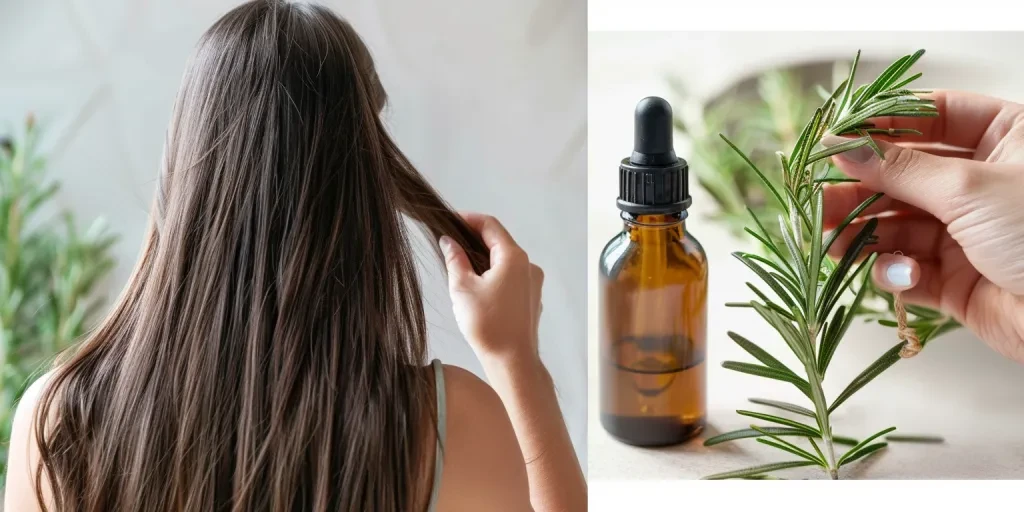
Benefits:
Promotes natural hair growth
Reduces hair thinning and hair fall
Helps prevent dandruff and scalp itchiness
Improves hair thickness and shine
How to Use: Mix a few drops of rosemary oil with a carrier oil like coconut or jojoba oil. Gently massage it into the scalp for 5–10 minutes. Leave it on for at least 30 minutes or overnight, then wash it out with shampoo. Use 2–3 times a week for best results.
Jojoba Oil
Botanical Name: Simmondsia chinensis
Jojoba oil is a gentle and effective hair growth oil that closely matches the natural oil produced by the scalp, called sebum. Because of this similarity, jojoba oil is easily absorbed and helps remove buildup that can clog hair follicles. This clears the way for nutrients to reach the roots, which can boost hair growth and improve scalp health.
In addition to promoting growth, jojoba oil is rich in vitamins and minerals that strengthen hair and keep the scalp balanced. It helps reduce dryness, flakiness, and breakage, making hair look softer and healthier. As a natural hair growth oil, jojoba oil is safe for all hair types and can be used regularly to maintain strong, well-nourished hair.
Benefits:
Moisturizes scalp and hair
Reduces hair breakage and dryness
Helps control dandruff
Supports healthy hair growth
How to Use: Warm a small amount of jojoba oil and massage it into the scalp. Leave it on for at least 30 minutes or overnight. Rinse with a mild shampoo. Use 2–3 times a week.
Bhringraj Oil
Bhringraj oil is a powerful hair growth oil widely used in Ayurveda to support healthy and strong hair. It helps improve blood circulation in the scalp, which allows more nutrients and oxygen to reach the hair follicles. This nourishes the roots, strengthens the strands, and encourages new hair growth. Regular use may also help reduce hair fall and promote thicker, fuller hair.
In addition to boosting growth, bhringraj oil has natural cooling and calming effects. These properties help soothe the scalp, reduce inflammation, and ease stress—a common cause of hair loss. As a natural hair growth oil, bhringraj oil supports overall scalp health and makes hair look darker, shinier, and more vibrant over time.

Botanical Name: Eclipta alba
Benefits:
Encourages hair growth
Reduces hair fall and thinning
Helps prevent dandruff and scalp irritation
Promotes darker, shinier hair
How to Use: Warm the oil slightly and massage into the scalp for 5–10 minutes. Leave it on for at least 30 minutes or overnight, then wash with mild shampoo. Use 2–3 times weekly.
Amla Oil
Amla oil is a well-known hair growth oil made from the amla fruit, which is packed with vitamin C and antioxidants. It works by nourishing the scalp and strengthening hair follicles, helping to stimulate hair growth. The oil improves blood circulation to the scalp, allowing more nutrients to reach the hair roots, which supports healthier and thicker hair.
In addition to promoting growth, amla oil helps balance the scalp’s natural oils, preventing dryness and flakiness. This keeps the scalp hydrated and healthy, reducing dandruff and irritation. By regularly using amla oil as a hair growth oil, you can improve hair texture, add shine, and reduce hair fall, leading to stronger, more vibrant hair over time.
Botanical Name: Phyllanthus emblica
Benefits:
Stimulates hair growth
Strengthens hair and reduces hair fall
Prevents dandruff and scalp irritation
Adds shine and softness to hair
How to Use: Massage amla oil into the scalp for 5–10 minutes. Leave it on for at least 30 minutes or overnight, then wash with a mild shampoo. Use 2–3 times a week for the best results.
Tea Tree Oil
Tea tree oil is an effective hair growth oil known for its ability to enhance scalp health. It works by unclogging hair follicles and clearing excess oils and buildup that can block new hair growth. By keeping the scalp clean and free of obstructions, tea tree oil promotes a healthier environment for hair to thrive.
In addition to supporting hair growth, tea tree oil has antibacterial and antifungal properties. These help prevent scalp infections, dandruff, and itchiness, ensuring the scalp remains free of irritation. Regular use of this hair growth oil helps create the right conditions for stronger, thicker hair and a balanced, healthy scalp.
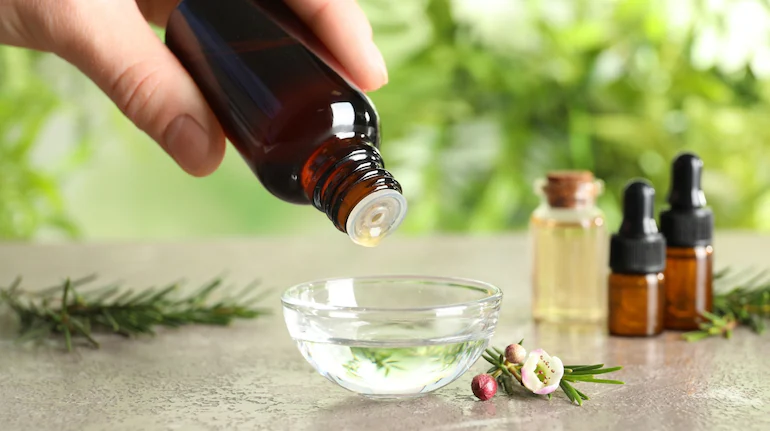
Botanical Name: Melaleuca alternifolia
Benefits:
Stimulates hair growth
Reduces dandruff and scalp irritation
Prevents scalp infections
Improves hair texture and strength
How to Use: Dilute tea tree oil with a carrier oil like coconut or jojoba oil and massage it into the scalp. Leave it on for 20–30 minutes before washing it out with shampoo. Use 2–3 times a week for best results.
Lavender Oil
Lavender oil is a well-known hair growth oil celebrated for its soothing and healing qualities. It works by enhancing blood circulation in the scalp, which helps stimulate hair follicles and promote healthy hair growth. Improved circulation ensures that hair roots receive more nutrients, supporting stronger and thicker hair.
In addition to stimulating growth, lavender oil also helps reduce stress, which is a common cause of hair loss. Its calming properties can ease tension, contributing to overall scalp health. Regular use of this hair growth oil not only supports hair growth but also creates a balanced, healthy environment for your hair to thrive.
Botanical Name: Lavandula angustifolia
Benefits:
Stimulates hair growth
Reduces stress-related hair loss
Improves scalp circulation
Has antibacterial properties to promote a healthy scalp
How to Use: Mix a few drops of lavender oil with a carrier oil like coconut or jojoba oil. Massage it into the scalp and leave it on for at least 30 minutes before washing it out. Use 2–3 times a week for the best results.
Peppermint Oil
Peppermint oil is a refreshing hair growth oil valued for its invigorating effects. It works by boosting blood circulation to the scalp, which helps deliver more nutrients to the hair follicles, promoting healthier and faster hair growth. The menthol in peppermint oil provides a cooling sensation that also helps soothe the scalp.
In addition to stimulating growth, peppermint oil helps reduce scalp irritation and inflammation, creating a healthier environment for hair to thrive. Its ability to refresh and calm the scalp makes it a great addition to any hair care routine. Using this hair growth oil regularly can support thicker, stronger hair and maintain a balanced scalp.
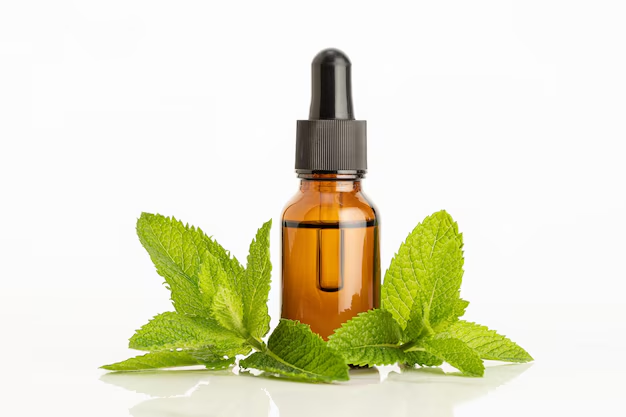
Botanical Name: Mentha piperita
Benefits:
Stimulates hair growth
Improves blood circulation to the scalp
Reduces scalp irritation and inflammation
Adds a refreshing feel to the scalp
How to Use: Dilute a few drops of peppermint oil with a carrier oil like coconut or jojoba oil. Massage into the scalp and leave it on for 20-30 minutes before rinsing out. Use 2–3 times a week for the best results.
Conclusion
In conclusion, maintaining healthy and strong hair is essential not just for appearance, but also for overall well-being. Our hair reflects our internal health and plays a vital role in protecting the scalp and boosting confidence. Incorporating hair growth oil into your daily or weekly routine can offer a natural, effective solution for various hair concerns such as thinning, breakage, dryness, and dandruff. The top 10 natural oils discussed—like coconut oil, castor oil, rosemary oil, and argan oil—are packed with nutrients, antioxidants, and fatty acids that nourish the scalp and stimulate hair follicles.
These oils are time-tested, chemical-free remedies that can dramatically improve hair texture, thickness, and growth when used consistently. Whether you’re aiming to combat hair loss or simply want to enhance your hair’s natural beauty, using a hair growth oil tailored to your specific needs can lead to noticeable, long-term results and healthier, more resilient hair.
FAQs
- What is hair growth oil and how does it work ?
Answer: Hair growth oil is a blend of natural or essential oils specifically formulated to stimulate hair follicles, improve scalp health, and promote faster, thicker hair growth. These oils work by increasing blood circulation to the scalp, nourishing hair roots with vital nutrients, and reducing issues like dryness, dandruff, or inflammation that can hinder hair growth. - How often should I apply hair growth oil ?
Answer: It’s generally recommended to apply hair growth oil 2 to 3 times per week. For best results, massage the oil into your scalp and leave it on for a few hours or overnight before washing. However, frequency can vary based on hair type and the specific oil used. - Can hair growth oils help with bald spots or hair thinning ?
Answer: Yes, many natural oils like castor oil and rosemary oil are known to stimulate dormant hair follicles and improve hair density. While results vary by individual and severity, consistent use can help reduce hair thinning and, in some cases, encourage regrowth in sparse areas. - Are there any side effects of using natural hair growth oils ?
Answer: Most natural hair growth oils are safe to use, but some people may experience allergic reactions or scalp irritation. It’s important to do a patch test before full application, especially with potent essential oils like tea tree or peppermint oil. Always dilute essential oils with a carrier oil. - Can I mix different hair growth oils together ?
Answer: Absolutely. Mixing complementary oils—such as coconut oil with rosemary oil or castor oil with argan oil—can enhance their benefits. Just ensure you maintain proper dilution ratios if using essential oils, and tailor blends to suit your scalp condition and hair goals.

